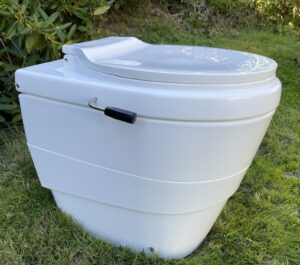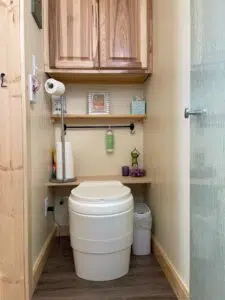Composting Toilets for Tiny Homes

Thinktank composting toilets for tiny home
There are many reasons to consider a composting toilet or waterless toilet for your tiny home. Sewer hook ups can be problematic. Holding tanks have to be dumped or pumped. Incinerating toilets are expensive, use a lot of energy, and the exhaust can smell awful.
A composting toilet is therefore an excellent solution in a tiny home.

tiny house composting toilet
Ventilation
There is not a lot of air inside a tiny home! You must be very conscious of any fan, appliance or toilet that exhausts air, especially if it is cold or hot outside and all windows are closed. I have seen many situations where a powerful bathroom fan or range hood fan over powered the small fan in a composting toilet. The result was stinky air was pulled IN to the home from the toilet! Ugh.
There are a couple of solutions. The simplest (and in our view the best) option is to install a Thinktank Waterless Toilet, which is an ideal composting toilet for tiny homes. These airtight toilets draw ventilation air from outside the tiny home, circulate it inside the toilet, and exhaust that same air outside. It is a closed system, and you won’t be depleting the air in your tiny home. Plus, you will save on energy costs, as you will not be blowing expensively heated or cooled air outside, as you are with we think all other waterless and composting toilets on the market today.
If you already have a composting toilet for a tiny home, you’ll need to make sure the fan in the toilet is not over powered when you turn on another fan elsewhere in your tiny home. You can crack a window in the bathroom, and shut the door. Weatherstripping under the bathroom door helps a lot.
There are commercially available systems for “make up air”. These may be a bit expensive, and are possibly overkill for a tiny home.
Vent Location
 It is critically important to properly locate the vent for your tiny house composting toilet. There is not a lot of odor coming out of the vent pipe – but there is some. The end of the vent pipe should not be within 8 feet of any area with foot traffic, a door, or an opening window. Sometimes you can just go straight out the wall and that location is fine. If not, you need to go through the wall, put a 90 degree elbow on the pipe, and run it up to the roof or above. There are other options, including going through the floor. But remember that air does not like to travel through a pipe, and the pipe must be as short and straight as possible. Consult with the person who sold you the toilet, or an HVAC specialist if in doubt.
It is critically important to properly locate the vent for your tiny house composting toilet. There is not a lot of odor coming out of the vent pipe – but there is some. The end of the vent pipe should not be within 8 feet of any area with foot traffic, a door, or an opening window. Sometimes you can just go straight out the wall and that location is fine. If not, you need to go through the wall, put a 90 degree elbow on the pipe, and run it up to the roof or above. There are other options, including going through the floor. But remember that air does not like to travel through a pipe, and the pipe must be as short and straight as possible. Consult with the person who sold you the toilet, or an HVAC specialist if in doubt.
Urine Drains for Tiny Home Composting Toilets
The pee from you tiny home composting toilet must be disposed of. If you are semi-permanently located, you may wish to run the urine drain line into a French drain or gray water system. If you have to move around, you’ll need a tank situated below the height of the toilet drain. On the Thinktank this is 7 inches high, at the back. You can buy a plastic tank, or even use a plastic gas can. Remember you will have to either lift out this tank and dump it, or connect a simple pump.

Urine drain (black pipe) exhaust vent and air intake on a tiny house composting toilet
The smaller, self contained composting toilets like the Airhead and Nature’s Head have urine bottles which are removed and dumped elsewhere. While initially easier to install, this is less convenient overall, because emptying the bottle gets tiresome. Two people will empty the bottle every 2 days or so.
Power for Tiny Home Composting Toilets
Proper, professionally designed composting toilets for tiny homes have fans. Don’t believe anyone that tells you otherwise. Vast experience has proven this to us. There is stinky, moist air in your toilet. It has to get outside. There are those that say you can bury the waste under sawdust. But this will drastically reduce the capacity of your tiny house composting toilet (and you do not want to empty more often that necessary!) Also, this requires a supply of sawdust in your home which takes up space, is messy, and may contain insects. Then, you hope it doesn’t stink. No. Get a toilet with a fan.
Composting toilets for tiny homes generally use very little power. Only a small fan is required. This usually only uses 2 or 3 watts of electricity. If you have a power hook up, just plug it in to a wall outlet. If you are off grid, power can be supplied by a 12 volt deep cycle battery. (Not a car battery. These are sometimes called marine or RV batteries). The battery can be easily charged with a small solar panel.
Summary
Composting toilets for tiny homes can be an ideal solution for the tiny home owner or builder looking for a simple, cost effective solution. If you plan carefully and pay attention to the details, you should have an odor free and problem free system for managing human waste.